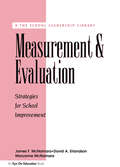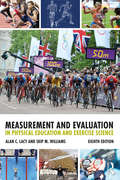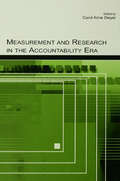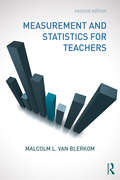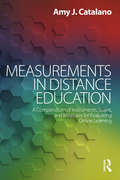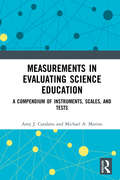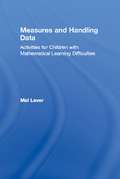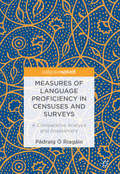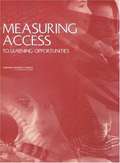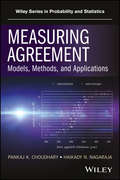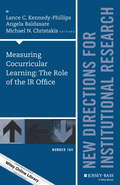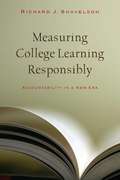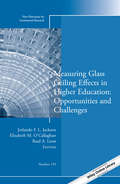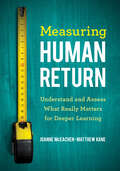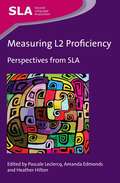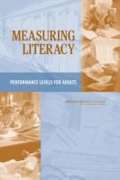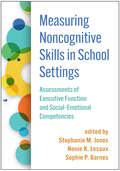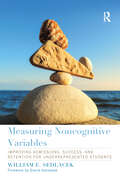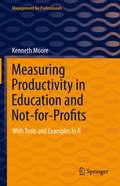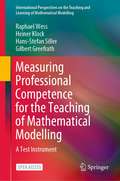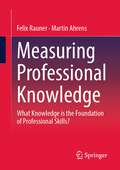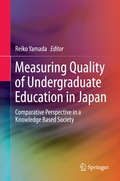- Table View
- List View
Measurement and Evaluation
by David A. Erlandson James Mc Namara Maryanne Mc NamaraWritten in a conversational style for principals who are not statisticians, this book will help you use measurement and evaluation to propel your school towards educational excellence.
Measurement and Evaluation in Physical Education and Exercise Science
by Alan C. Lacy Skip M. WilliamsThe eighth edition of Measurement and Evaluation in Physical Education and Exercise Science, now published in paperback and hardback, offers students a clear and practical guide to best practice for measurement and evaluation in school- and nonschool-based physical activity programs. Written by two academics with backgrounds in physical education teacher education (PETE), the book emphasizes the link between theory and practice and reflects the most recent changes in national physical education programs. It covers a full range of introductory topics, including current trends in measurement and evaluation, program development, statistics, test selection, and an expanded chapter on alternative assessment, before introducing: • measurement for health-related physical fitness • measurement for psychomotor skills • measurement for cognitive knowledge • measurement for affective behaviors • grading • self-evaluation. Each chapter features learning aids such as objectives, key terms, practical applications, and review questions, while an appendix offers in-depth Excel assignments. Offering a full companion website featuring an instructor’s manual, lecture slides, and a test bank, Measurement and Evaluation in Physical Education and Exercise Science is a complete resource for instructors and students, alike. It is an essential text for students in measurement and evaluation classes as part of a degree program in physical education, exercise science or kinesiology, and a valuable reference for practitioners seeking to inform their professional practice.
Measurement and Evaluation in Post-Secondary ESL
by Glayol V. EkbataniPractical and concise, this introductory text for language teaching professionals is a guide to ESL assessment and to fulfilling the testing component of TESOL programs in the U.S. and around the world. Covering the fundamental descriptive and quantitative facets of effective language testing, it explicates key technical aspects in an accessible, non-technical manner. Each chapter includes relevant practical examples and is augmented by a partnered project that provides practical opportunities for readers to apply the concepts presented in real testing situations. Measurement and Evaluation in Post-Secondary ESL: Discusses effective methods of evaluating the language proficiency of college-bound English language learners in various skills areas such as reading, oral proficiency, and writing Takes a fresh look at accepted assessment concepts and issues such as validity and reliability, construct definition, authenticity, washback, reliable scoring, rater training, holistic and analytic rubrics, standardized tests, and statistical concepts Places special emphasis on innovative methods and alternative forms of assessment, such as self and portfolio assessment, as an adjunct to traditional methods Reviews the changes in the new internet-based Test of English a Second Language launched in 2005 Addresses the role and responsibilities of assessors
Measurement and Research in the Accountability Era
by Carol Anne DwyerThe subject of accountability warrants thoughtful and dispassionate attention in today's educational environment. The accountability and school reform policies that are put in place today will have wide-ranging and long-lasting consequences for all of the nation's learners. This volume stems from the 2003 Educational Testing Service Invitational Co
Measurement and Statistics for Teachers
by Malcolm L. Van BlerkomMeasurement and Statistics for Teachers deftly combines descriptive statistics and measurement in the classroom into a student-friendly, practical volume. Based on a course taught by the author for the past 25 years, this book offers to undergraduate education students a clear account of the basic issues in measurement and details best practices for administering performance assessments, interpreting test scores, and evaluating student writing. This second edition includes updated pedagogical features, timely discussions of student assessment, state standards (including NCLB), and an expanded focus that incorporates the needs of Early Childhood, Elementary, and Secondary teachers.
Measurements in Distance Education: A Compendium of Instruments, Scales, and Measures for Evaluating Online Learning
by Amy J. CatalanoAs more postsecondary faculty become engaged in designing online learning environments, research conducted on distance education program quality becomes increasingly important. Measurements in Distance Education is a concise, well-organized guide to some of the many instruments, scales, and methods that have been created to assess distance education environments, learners, and teachers. Entries are organized according to the qualities these measures attempt to gauge—such as engagement and information retention—and provide summaries of each instrument, usage information, the history of its development, and validation, including any reported psychometric properties. Offering more than 50 different surveys, tests, and other metrics, this book is an essential reference for anyone interested in understanding distance education assessment.
Measurements in Evaluating Science Education: A Compendium of Instruments, Scales, and Tests
by Amy J. Catalano Michael A. MarinoMeasurements in Evaluating Science Education is a comprehensive, intuitive guide to many of the key instruments created to assess science education environments, learning, and instruction. Nearly 70 different surveys, tests, scales, and other metrics are organized according to the qualities the measures attempt to gauge, such as attitudes toward science, beliefs and misconceptions, self-efficacy, and content knowledge. Summaries of each instrument, usage information, developmental history and validation, and reported psychometric properties make this an essential reference for anyone interested in understanding science education assessment.
Measures and Handling Data: Activities for Children with Mathematical Learning Difficulties
by Mel LeverFirst Published in 2003. Routledge is an imprint of Taylor & Francis, an informa company.
Measures of Language Proficiency in Censuses and Surveys: A Comparative Analysis and Assessment
by Pádraig Ó RiagáinThis book offers a systematic analysis of a wide range of questions used in censuses, national surveys and international surveys to measure language proficiency. It addresses the urgent need in language related survey research for a comprehensive examination of the large existing body of survey data in order to provide a fuller understanding of the extent to which survey results are shaped by the way language proficiency questions are worded. While census and survey language proficiency data are extensively used in a wide range of research areas, as well as in forming, implementing and monitoring government policies, there are as yet no universally accepted survey measures of language proficiency. This book will therefore provide a valuable resource for students and scholars working in sociological areas that use census or survey language data, such as sociology of language, sociology of education, politics, racial and ethnic studies, and cultural studies; as well as for policy analysts.
Measuring Access To Learning Opportunities
by Committee on Improving Measures of Access to Equal Educational OpportunitySince 1968 the Elementary and Secondary School Civil Rights Compliance Report (known as the E&S survey) has been used to gather information about possible disparities in access to learning opportunities and violations of students’ civil rights. Thirty-five years after the initiation of the E&S survey, large disparities remain both in educational outcomes and in access to learning opportunities and resources. These disparities may reflect violations of students’ civil rights, the failure of education policies and practices to provide students from all backgrounds with a similar educational experience, or both. They may also reflect the failure of schools to fully compensate for disparities and current differences in parents’ education, income, and family structure. The Committee on Improving Measures of Access to Equal Educational Opportunities concludes that the E&S survey continues to play an essential role in documenting these disparities and in providing information that is useful both in guiding efforts to protect students’ civil rights and for informing educational policy and practice. The committee also concludes that the survey’s usefulness and access to the survey data could be improved.
Measuring Agreement: Models, Methods, and Applications
by Pankaj K. Choudhary Haikady N. NagarajaPresents statistical methodologies for analyzing common types of data from method comparison experiments and illustrates their applications through detailed case studies Measuring Agreement: Models, Methods, and Applications features statistical evaluation of agreement between two or more methods of measurement of a variable with a primary focus on continuous data. The authors view the analysis of method comparison data as a two-step procedure where an adequate model for the data is found, and then inferential techniques are applied for appropriate functions of parameters of the model. The presentation is accessible to a wide audience and provides the necessary technical details and references. In addition, the authors present chapter-length explorations of data from paired measurements designs, repeated measurements designs, and multiple methods; data with covariates; and heteroscedastic, longitudinal, and categorical data. The book also: * Strikes a balance between theory and applications * Presents parametric as well as nonparametric methodologies * Provides a concise introduction to Cohen's kappa coefficient and other measures of agreement for binary and categorical data * Discusses sample size determination for trials on measuring agreement * Contains real-world case studies and exercises throughout * Provides a supplemental website containing the related datasets and R code Measuring Agreement: Models, Methods, and Applications is a resource for statisticians and biostatisticians engaged in data analysis, consultancy, and methodological research. It is a reference for clinical chemists, ecologists, and biomedical and other scientists who deal with development and validation of measurement methods. This book can also serve as a graduate-level text for students in statistics and biostatistics.
Measuring Cocurricular Learning: New Directions for Institutional Research, Number 164 (J-B IR Single Issue Institutional Research)
by Lance C. Kennedy-Phillips Angela Baldasare Michael N. ChristakisThis volume examines the complexities of measuring co-curricular learning and discusses the role of the institutional research professional in measuring learning outside of the classroom. This volume explores: Contemporary theories around co-curricular learning and its influence on student success; The role of accountability and accreditation when considering the methods to measure co-curricular learning; How co-curricular data align with university goals and priorities; The differences between direct and indirect measures of cocurricular learning; and The roles the institutional research office can play as a leader and collaborator in the measurement of co-curricular learning. This is the 164th volume of this Jossey-Bass quarterly report series. Timely and comprehensive, New Directions for Institutional Research provides planners and administrators in all types of academic institutions with guidelines in such areas as resource coordination, information analysis, program evaluation, and institutional management.
Measuring College Learning Responsibly
by Richard J. ShavelsonAccrediting boards, the federal government, and state legislatures are now requiring a greater level of accountability from higher education. However, current accountability practices, including accreditation, No Child Left Behind, and performance reporting are inadequate to the task. If wielded indiscriminately, accountability can actually do more harm than good. This innovative work looks broadly at how accountability is being considered by campuses, accrediting boards, higher education organizations, and governments in the US and abroad. It explores how new demands for accountability and new technologies are changing the way student learning is assessed. The author, one of the most respected assessment researchers in the nation, provides a framework for assessing student learning and discusses historical and contemporary debates in the field. He details new directions in assessment, such as the Collegiate Learning Assessment he helped develop, analyzes exemplary campus assessment programs, and proposes considerations necessary for designing successful accountability systems.
Measuring Glass Ceiling Effects in Higher Education: New Directions for Institutional Research, Number 159 (J-B IR Single Issue Institutional Research)
by Jerlando F. L. Jackson Elizabeth M. O’Callaghan Raul A. LeonThis volume offers readers a comprehensive means to understanding glass ceiling effects in higher education. Each chapter approaches the glass ceiling from a different perspective, providing compellingarguments that truly highlight the importance and usefulness of collecting data on this topic. Institutional decision makers will find valuable information to confront the challenge of glass ceiling effects across different institutional environments. Likewise, institutional researchers will find step-by-step protocols to collect and analyze glass ceiling data as well as a variety of rich examples. Readers will not only find this sourcebook useful for institutional planning purposes, but it will also help them truly understand how the glass ceiling impacts women and people of color in higher education.
Measuring Human Return: Understand and Assess What Really Matters for Deeper Learning
by Dr Joanne J. McEachen Mr Matthew KaneMeasure what matters for deeper learning Discover what matters for your students and develop deeper learning outcomes that connect with their lives. How can you develop what matters without solid measurement? Follow this comprehensive, systematic process for assessing and measuring students’ self-understanding, knowledge, competencies, and connection through vignettes, case studies, learning experiences and tools. Develop key system capabilities to build the foundation for sustainable engagement, measurement, and change Discover five comprehensive “frames” for measuring deeper learning Engage in the process of collaborative inquiry Commit to the central, active role of learners by engaging them as active partners in every aspect of their learning
Measuring Human Return: Understand and Assess What Really Matters for Deeper Learning
by Dr Joanne J. McEachen Mr Matthew KaneMeasure what matters for deeper learning Discover what matters for your students and develop deeper learning outcomes that connect with their lives. How can you develop what matters without solid measurement? Follow this comprehensive, systematic process for assessing and measuring students’ self-understanding, knowledge, competencies, and connection through vignettes, case studies, learning experiences and tools. Develop key system capabilities to build the foundation for sustainable engagement, measurement, and change Discover five comprehensive “frames” for measuring deeper learning Engage in the process of collaborative inquiry Commit to the central, active role of learners by engaging them as active partners in every aspect of their learning
Measuring Instructional Results: How To Find Out If Your Instructional Objectives Have Been Achieved (Mager Six-pack Ser.)
by Robert MagerThis book shows you how to develop the tools you need to measure instructional results and demonstrate the value of your training.
Measuring L2 Proficiency
by Amanda Edmonds Pascale LeclercqThe creation of the Common European Framework of Reference for Languages (CEFR) has given rise to interest and debate among policy makers, testers, teachers and researchers alike in the reliability and feasibility of the assessment of second language (L2) proficiency. This volume brings together concrete ideas on identifying and measuring L2 proficiency from different branches of SLA research (psycholinguistic, sociolinguistic, corpus-based, applied linguistics) to contribute to a deeper understanding of what it means to be proficient in an L2. The chapters introduce a wide range of tools that are innovative, reliable, and easy-to-use for the evaluation of learners' language level with respect to both productive and receptive skills and provide a variety of answers to the question of how to assess L2 proficiency in a valid, reliable and practical manner. The collection will therefore inspire language teachers, teacher trainers and language testing specialists and help them adapt their assessment practices when necessary, and will also be a valuable resource for postgraduate students and researchers.
Measuring Literacy: Performance Levels For Adults
by National Research Council of the National AcademiesThe National Assessment of Adult Literacy (NAAL) is a household survey conducted periodically by the Department of Education that evaluates the literacy skills of a sample of adults in the United Stages ages 16 and older. NAAL results are used to characterize adults’ literacy skills and to inform policy and programmatic decisions. The Committee on Performance Levels for Adult Literacy was convened at the Department’s request for assistance in determining a means for booking assessment results that would be useful and understandable for NAAL’S many varied audiences. Through a process detailed in the book, the committee determined that five performance level categories should be used to characterize adults’ literacy skills: nonliterate in English, below basic literacy, basic literacy, intermediate literacy, and advanced literacy. This book documents the process the committee used to determine these performance categories, estimates the percentages of adults whose literacy skills fall into each category, recommends ways to communicate about adults’ literacy skills based on NAAL, and makes suggestions for ways to improve future assessments of adult literacy.
Measuring Noncognitive Skills in School Settings: Assessments of Executive Function and Social-Emotional Competencies
by Stephanie M. Jones, Nonie K. Lesaux and Sophie P. BarnesChildren's social–emotional and self-regulation skills are critical for success in school and, ultimately, in the workplace. How can educators determine the most effective approaches for measuring students' interpersonal competencies? And how can they use the data to improve their own practice? Relevant for school leaders, educators, researchers, and other stakeholders, this book brings together leading experts from multiple disciplines to discuss the current state of measurement and assessment of a broad range of noncognitive skills and present an array of innovative tools. Chapters describe measures targeting the individual student, classroom, whole school, and community; highlight implications for instructional decision making; examine key issues in methodology, practice, and policy; and share examples of systematic school- and districtwide implementation.
Measuring Noncognitive Variables: Improving Admissions, Success and Retention for Underrepresented Students
by William SedlacekCo-published in association with Big Picture Learning.Measuring Noncognitive Variables: Improving Admissions, Success, and Retention for Underrepresented Students is written for admissions professionals, counselors, faculty and advisers who admit, teach, or work with students during the admissions process and post-enrollment period. It brings together theory, research and practice related to noncognitive variables in a practical way by using assessment methods provided at no cost. Noncognitive variables have been shown to correlate with the academic success of students of all races, cultures, and backgrounds. Noncognitive variables include personal and social dimensions, adjustment, motivation, and student perceptions, rather than the traditional verbal and quantitative areas (often called cognitive) typically measured by standardized tests.Key Features include:* Models that raise concepts related to innovation, diversity and racism in proactive ways* Examples of admission and post-enrollment applications that show how schools and programs can use noncognitive variables in a variety of ways * Additional examples from foundations, professional associations, and K-12 programs* An overview of the limitations of traditional assessment methods such as admission tests, grades, and courses takenEducation professionals involved in the admissions process will find this guide effectively informs their practice. This guide is also appropriate as a textbook in a range of courses offered in Higher Education and Student Affairs Masters and PhD programs.
Measuring Productivity in Education and Not-for-Profits: With Tools and Examples in R (Management for Professionals)
by Kenneth MooreThis book takes the reader through real-world examples for how to characterize and measure the productivity and performance of NFPs and education institutions—that is, organisations that produce value for society, which cannot be measured accurately in financial KPIs. It focuses on how best to frame non-profit performance and productivity, and provides a suite of tools for measurement and benchmarking. It further challenges the reader to consider alternative and appropriate uses of quantitative measures, which are fit-for-purpose in individual contexts.It is true that the risk of misusing quantitative measures is ever-present. But does that risk outweigh the benefits of forming a more precise and shared understanding of what could generate better outcomes? There will always be concerns about policy and performance management. Goodheart’s Law states that once a measure becomes a target, it is no longer a good measure. This book helps to strike a meaningful balance between what can be measured, what cannot, and how best to use quantitative information in sectors that are often averse to being held up to the light and put on a scale by outsiders.
Measuring Professional Competence for the Teaching of Mathematical Modelling: A Test Instrument (International Perspectives on the Teaching and Learning of Mathematical Modelling)
by Gilbert Greefrath Hans-Stefan Siller Raphael Wess Heiner KlockThis open access book presents a structural model and an associated test instrument designed to provide a detailed analysis of professional competences for teaching mathematical modelling. The conceptualisation is based on the COACTIV model, which describes aspects, areas and facets of professional competences of teachers. The manual provides an overview of the essential teaching skills in application-related contexts and offers the tools needed to capture these aspects. It discusses the objectives and application areas of the instrument, as well as the development of the test. In addition, it describes the implementation and evaluates the quality and results of the structural equation analysis of the model. Teaching mathematical modelling is a cognitively challenging activity for (prospective) teachers. Thus, teacher education requires a detailed analysis of professional competence for teaching mathematical modelling. Measuring this competence requires theoretical models that accurately describe requirements placed upon teachers, as well as appropriate evaluation tools that adequately capture skills and abilities in this field. This book presents an instrument that measures the professional competences in a sample of 349 prospective teachers.
Measuring Professional Knowledge: What Knowledge is the Foundation of Professional Skills?
by Felix Rauner Martin AhrensIn this book, we show the replacement of academic and vocational education, which is structured according to subject systems and oriented towards scientific knowledge, by vocational action knowledge. This work process knowledge is the basis for the acquisition of the design competence of vocational specialists, which is becoming increasingly important in the world of work.A modern knowledge concept based on vocational education is developed and documented. In the first part of the book the concept of vocational knowledge is developed, in the second part empirical results from COMET projects are documented, from which the vocational knowledge imparted in different occupations can be read.There has been a confusing discussion about vocational knowledge for decades. In 1991, the KMK agreed on a new concept for vocational education and training with the guiding idea of vocational design competence. It remained open on which vocational knowledge this new guiding idea should be based. Up to now there has been no original vocational pedagogical justification for the vocational knowledge on which vocational design competence is based.
Measuring Quality of Undergraduate Education in Japan
by Reiko YamadaThis book explores how the global trend of quality assurance in higher education is related to the boom of measuring learning outcomes in Japan. It also presents a comparative study in higher education policy between Japan and the US, examining how both countries have reacted to the demands of globalization. This comparative view will help readers understand the present issues Japanese higher education faces and grasp the commonalties and differences between American and Japanese higher education. The book first explores the forces of globalization that have resulted in Japanese universities emphasizing student learning outcomes. Next, it examines how Japanese higher education has learned from the experience of the U. S. , whose higher education reform has been regarded as a model for Japan. The book explains why quality assurance for teaching and learning has become important for all Japanese higher education institutions. Higher Education on a global basis is now facing a great issue. In order to help students in a competitive global market, universities need to become more teaching-and-learning-centered and develop more internationalized curricula. This book provides comparative views for cultural and structural similarities and differences in higher education in two countries which could explain significant differences in the gains students make in college. It will help readers understand not only how student learning outcomes can be measured, but why universities throughout the world must continually strive to become world-class institutions.
